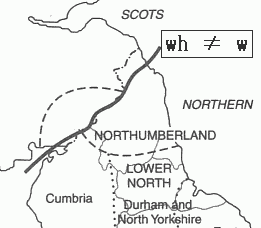hellog〜英語史ブログ / 2014-03-27
01 02 03 04 05 06 07 08 09 10 11 12 13 14 15 16 17 18 19 20 21 22 23 24 25 26 27 28 29 30 31
2014-03-27 Thu
■ #1795. 方言に生き残る wh の発音 [map][pronunciation][dialect][digraph]
「#1783. whole の <w>」 ([2014-03-15-1]) で <wh> の綴字と対応する発音について触れた.現代標準英語では,<wh> も <w> も同様に /w/ に対応し,かつてあった区別はない.しかし,文献によると19世紀後半までは標準変種でも区別がつけられていたし,方言を問題にすれば今でも健在だ.私自身もスコットランド留学中には定常的に /hw/ の発音を聞いていたのを覚えている.<wh> = /hw/ の関係が生きている方言分布についての言及を集めてみた.まずは,Crystal (466) から.
One example is the distinction between a voiced and a voiceless w --- as in Wales vs whales --- which was maintained in educated speech until the second half of the nineteenth century. That the change was taking place during that period is evident from the way people began to notice it and condemn it. For Cardinal Newman's younger brother, Francis, writing in his seventies in 1878, comments: 'W for Hw is an especial disgrace of Southern England.' Today, it is not a feature of Received Pronunciation . . ., though it is kept in several regional accents . . . .
OED の wh, n. によると,次のような記述がある.
In Old English the pronunciation symbolized by hw was probably in the earliest periods a voiced bilabial consonant preceded by a breath. This was developed in two different directions: (1) it was reduced to a simple voiced consonant /w/; (2) by the influence of the accompanying breath, the voiced /w/ became unvoiced. The first of these pronunciations /w/ probably became current first in southern Middle English under the influence of French speakers, whence it spread northwards (but Middle English orthography gives no reliable evidence on this point). It is now universal in English dialect speech except in the four northernmost counties and north Yorkshire, and is the prevailing pronunciation among educated speakers. The second pronunciation, denoted in this Dictionary by the conventional symbol /hw/, . . . is general in Scotland, Ireland, and America, and is used by a large proportion of educated speakers in England, either from social or educational tradition, or from a preference for what is considered a careful or correct pronunciation.
さらに,LPD の "wh Spelling-to-Sound" によれば,
Where the spelling is the digraph wh, the pronunciation in most cases is w, as in white waɪt. An alternative pronunciation, depending on regional, social and stylistic factors, is hw, thus hwaɪt. This h pronunciation is usually in Scottish and Irish English, and decreasingly so in AmE, but not otherwise. (Among those who pronounce simple w, the pronunciation with hw tends to be considered 'better', and so is used by some people in formal styles only.) Learners of EFL are recommended to use plain w.
そして,Trudgill (39) にも.
[The Northumberland area, which also includes some adjacent areas of Cumbria and Durham] is the only area of England . . . to retain the Anglo-Saxon and mediaeval distinction between words like witch and which as 'witch' and 'hwitch'. Elsewhere in the country, the 'hw' sound has been lost and replaced by 'w' so that whales is identical with Wales, what with watt, and so on. This distinction also survives in Scotland, Ireland and parts of North America and New Zealand, but as far as the natural vernacular speech of England is concerned, Northumberland is uniquely conservative in retaining 'hw'. This means that in Northumberland, trade names like Weetabix don't work very well since weet suggests 'weet' /wiːt/ whereas wheat is locally pronounced 'hweet' /hwiːt/.
イングランドに限れば,分布はおよそ以下の地域に限定されるということである.

関連して「#452. イングランド英語の諸方言における r」 ([2010-07-23-1]) も参照.イングランド方言全般については,「#1029. England の現代英語方言区分 (1)」 ([2012-02-20-1]) 及び「#1030. England の現代英語方言区分 (2)」 ([2012-02-21-1]) を参照.
・ Crystal, David. The Stories of English. London: Penguin, 2005.
・ Wells, J C. ed. Longman Pronunciation Dictionary. 3rd ed. Harlow: Pearson Education, 2008.
・ Trudgill, Peter. The Dialects of England. 2nd ed. Oxford: Blackwell, 2000.
2026 : 01 02 03 04 05 06 07 08 09 10 11 12
2025 : 01 02 03 04 05 06 07 08 09 10 11 12
2024 : 01 02 03 04 05 06 07 08 09 10 11 12
2023 : 01 02 03 04 05 06 07 08 09 10 11 12
2022 : 01 02 03 04 05 06 07 08 09 10 11 12
2021 : 01 02 03 04 05 06 07 08 09 10 11 12
2020 : 01 02 03 04 05 06 07 08 09 10 11 12
2019 : 01 02 03 04 05 06 07 08 09 10 11 12
2018 : 01 02 03 04 05 06 07 08 09 10 11 12
2017 : 01 02 03 04 05 06 07 08 09 10 11 12
2016 : 01 02 03 04 05 06 07 08 09 10 11 12
2015 : 01 02 03 04 05 06 07 08 09 10 11 12
2014 : 01 02 03 04 05 06 07 08 09 10 11 12
2013 : 01 02 03 04 05 06 07 08 09 10 11 12
2012 : 01 02 03 04 05 06 07 08 09 10 11 12
2011 : 01 02 03 04 05 06 07 08 09 10 11 12
2010 : 01 02 03 04 05 06 07 08 09 10 11 12
2009 : 01 02 03 04 05 06 07 08 09 10 11 12
最終更新時間: 2026-01-27 10:29
Powered by WinChalow1.0rc4 based on chalow